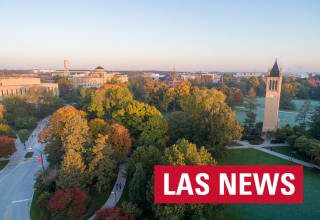LAS projects awarded additional funding to further the university’s strategic plan
Author: Stacey Maifeld
Author: Stacey Maifeld
 Resumés touting Ames National Laboratory internships or expertise in artificial intelligence will help set Cyclone graduates apart from the competition, thanks to faculty-led projects in the College of Liberal Arts and Sciences (LAS).
Resumés touting Ames National Laboratory internships or expertise in artificial intelligence will help set Cyclone graduates apart from the competition, thanks to faculty-led projects in the College of Liberal Arts and Sciences (LAS).
LAS projects focusing on artificial intelligence in the humanities and support for undergraduate student internships at Ames National Laboratory are among those receiving a second year of funding to help advance the university’s 2022-31 strategic plan goals.
Iowa State chose 12 projects to receive the second-year funds for a total commitment of $2.1 million. Seven other projects that received strategic plan funds last year are already complete or nearing completion. The university anticipates a future call for proposals for FY26 strategic plan funding.
“These LAS projects showcase the research and student-centered experiences at the heart of discovery and learning in our college,” said Benjamin Withers, dean of the College of Liberal Arts and Sciences. “They advance innovation in the fundamental sciences, humanities, and social sciences, while also providing career-ready learning experiences. I commend the leaders involved in these projects for their efforts and vision, and I look forward to the growth of their work through this additional funding.”
The project “Supporting University Undergraduate Internships in the Ames National Laboratory” gives students real-world experiences by harnessing one of Iowa State’s unique advantages: the presence of a Department of Energy (DOE) National Laboratory on campus. The DOE National Lab system is comprised of 17 DOE laboratories throughout the country, addressing national priorities in energy and climate, national security, and environment. Experience at Ames National Laboratory creates opportunities for students to serve the broad needs of DOE.
Led by Theresa Windus, Distinguished Professor and chair of the Department of Chemistry, the project created a program called ISU-AMES Student-Centric Internships, Enabling Next-generation Critical Energy Sciences (ISU-AMES SCIENCES). In year one, it placed 20 Iowa State students in paid internships at Ames National Laboratory. The project was awarded $127,362 in second-year funding and aims to enroll 50 students by its third year.
The program offers experiences beyond classroom education that prepare students for future job opportunities. Students can participate in cutting-edge, multidisciplinary fundamental science research or gain management experience in operations-related roles in accounting, communications, supply chain management, and many other areas. Mentorship from the lab’s research scientists, staff, and joint faculty, along with professional development education, are also critical components of the program.
Project leaders hope to help attract top students to Iowa State, prepare students for future careers, and help expand the state and nation’s energy sciences workforce. The project team also includes Paul Canfield, Distinguished Professor in the Department of Physics and Astronomy, and Surya Mallapragada, Anson Marston Distinguished Professor in Engineering and associate vice president for research, both of whom have joint positions at Ames National Laboratory. Leaders from Ames National Laboratory include Adam Schwartz, director; James Morris, chief research officer; and Kelly Bergman, education and outreach program manager.
Led by Volker Hegelheimer, chair of the Department of English, the project “Forging New Frontiers in Artificial Intelligence” will receive $59,645 in second-year funds. During the project’s first year, John Monroe, professor of history, and Ritwik Banerji, assistant professor of anthropology, took on leadership roles in creating multiple campus engagement opportunities to help Iowa State faculty and students examine the impacts of AI on research, teaching, and learning.
Leaders organized a March 2024 symposium on artificial intelligence in the humanities. The two-day event brought together humanities and social sciences faculty with guests from across the country and explored directions for research and teaching curriculum. The symposium aimed to ground attendees in the historical context of AI and remind them that AI is an “intrinsically humanistic” endeavor.
The project also created new experiential student learning opportunities with an innovative world-building competition. Co-hosted by the Departments of English and History during the spring 2024 semester, 15 student teams from across campus were challenged to imagine a future shaped by artificial intelligence. Drawing upon humanities and social science research, each team creatively designed a game world in which multiple narratives could unfold – set in an imagined future shaped by AI.
In addition, leaders worked on identifying artificial intelligence programs and degrees at other universities and funding opportunities and created a faculty learning community with 16 participants. Some of the project’s second-year goals include expanding faculty participation, hosting a second research symposium, and examining curriculum innovation in writing courses.